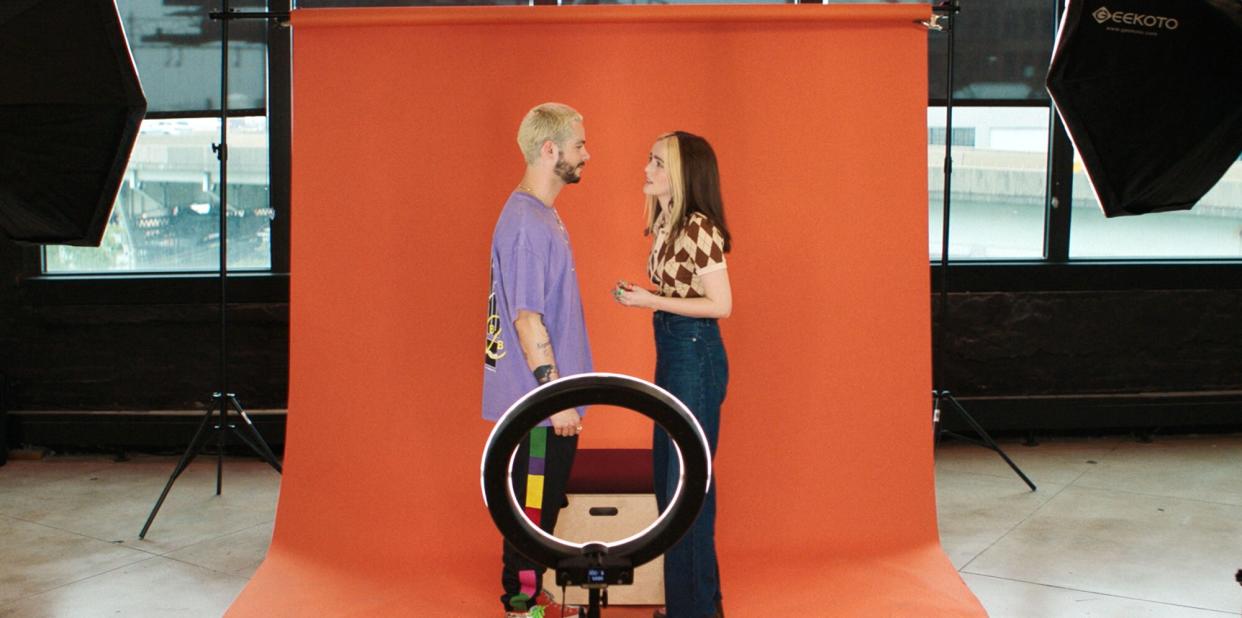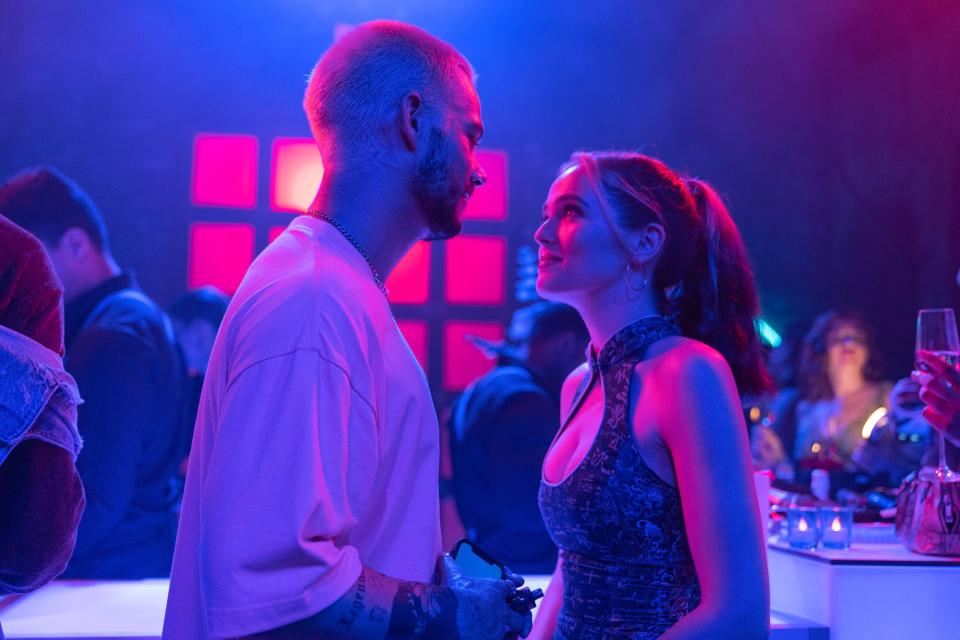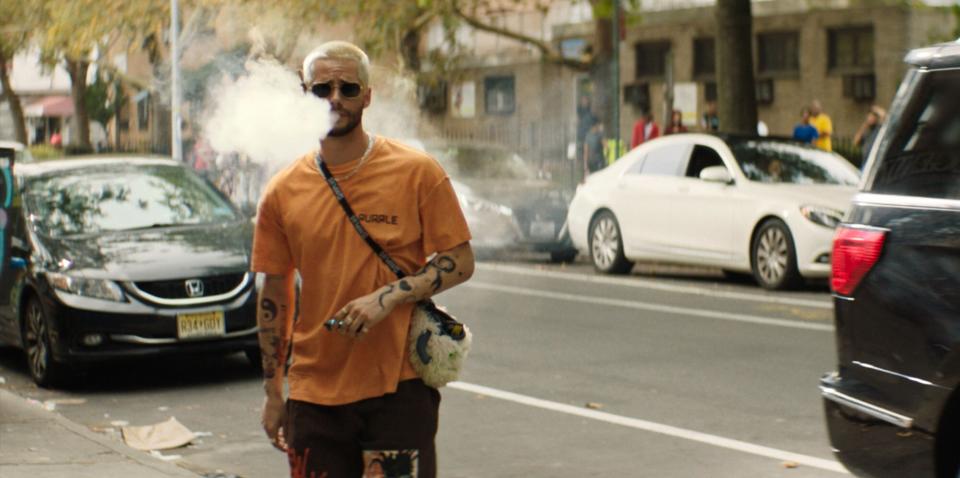Not Okay director wants you to hate Zoey Deutch and Dylan O'Brien's characters: 'That's the point'

- Oops!Something went wrong.Please try again later.
- Oops!Something went wrong.Please try again later.
Warning: This article contains spoilers about the ending of Not Okay.
An unusual warning appears at the beginning of Not Okay: "This film contains flashing lights, themes of trauma, and an unlikable female protagonist. Viewer discretion advised." Director Quinn Shephard wants to let you know immediately that Danni Sanders (Zoey Deutch) is not your usual main character. You're supposed to hate her. Same goes for her love interest, her coworker Colin (Dylan O'Brien). And yet, Shephard is fascinated to see how viewers are still "shipping" them and thirsting after both of them.
Such is the complicated irony behind Not Okay. Written and directed by Shephard, 27, the movie centers on Danni Sanders, a lonely wannabe writer who fakes a retreat to Paris while hiding out in her Brooklyn apartment, all so she can post aesthetically-pleasing Instagram photos. But when a terrorist attack hits Paris minutes after she posts a Photoshopped selfie at the Arc de Triomphe, instead of coming clean about her lie, she leans into it, deciding to take full advantage of the opportunity to become a social-media celebrity. Danni attains the life and followers she always wanted — but it's only a matter of time before she learns the hard way that the Internet loves a takedown.
Below, Shephard talks about the message she wanted to send with Not Okay, the plot's eerily similar connections to Dear Evan Hansen, and more. Plus, watch the director give her commentary on O'Brien's shocking transformation into Colin in the exclusive video above.

Searchlight Pictures
ENTERTAINMENT WEEKLY: Where did you get the inspiration for Not Okay?
QUINN SHEPHARD: I started working on the script in 2018, and the idea really derived from genuinely just wanting to capture the feeling that I was having daily when I would check my phone and see the most horrible news you could imagine next to somebody's vacation Instagram stories, influencer skincare ads, and gifting suites. It was all mixed with political unrest and deep anxiety and resources for mental health. It was just such a bizarre space to exist in, and it was something that I realized myself and everyone around me was just digesting daily all at once in one scroll. And it created this sense of almost a detachment from reality — at least that's how I felt — that I really wanted to talk about and I hadn't seen addressed in a film.
It was powerful to see this unflinching and realistic portrayal of a privileged white woman who was literally stealing words and ideas from a young Black activist, because that happens all the time but isn't talked about enough.
I'm really glad you said that because it's always funny to me when I have conversations with people and they really think the movie is a takedown of influencers. It's genuinely not. It is about what you're talking about: Danni is sort of a millennial Karen figure in that she's constantly committing these microaggressions. She's constantly commodifying and co-opting somebody else's trauma, and she is exploiting Rowan (Mia Isaac), somebody who is a real activist using her platform for good, and she's not even realizing that she's doing it.
There's a book, Such a Fun Age, by Kiley Reid, and I sent it to both Mia and Zoey when we were prepping for this. I just loved it because it's one of those satires that is so uncomfortable because when you read it, you can see yourself in the characters, but then you just watch the main woman make the worst decisions over and over until you hate her and yourself all at once, and you're like, "I don't want to be this person." And that was very much the feeling that I wanted people to get from Danni. I wanted people to relate to her and then just to kind of be filled with this discomfort of: I've got to confront that in myself.
While watching the movie, I kept getting major Dear Evan Hansen vibes because that's another story where a main character co-opts a tragedy, his classmate's suicide, for personal gain. Was that in your mind when you were making this movie?
This is so funny — you are not the first person who said this. I've never seen Dear Evan Hansen in any form. I am probably the least familiar person with musicals ever. I know nothing about Dear Evan Hansen, but I do know that it's been mentioned a lot in reviews, so apparently this is similar. I actually had absolutely no idea that even existed when I started working on this. I love the tweets that are like, "This is if Dear Evan Hansen realized that the main character is a piece of s---."

Nicole Rivelli/Searchlight Pictures
Why did you want to open the movie with the warning that it features an "unlikable female protagonist"?
There has been a long standing tradition of male-driven satire: Walter White, Patrick Bateman, the Nightcrawler film, things like that. There are so many films in that genre, and I don't think audiences have struggled to understand what the projects were saying purely because there was a character doing problematic things at the center. People tended to understand inherently what the project was criticizing. And with this, it was really interesting: At our first test screening, there was so many people who reacted to the film in a very confused way because they were like, "Everything about it is technically good, but why would you make a movie with a woman who's hatable?" Some people, not to say who, but ... a certain demographic was like, "Why would you do this?"
I feel like I can assume which demographic that might have been.
It was fascinating. We would literally get notes that were like, "I couldn't stand her. Are we supposed to?" So then they're like, "I guess I didn't like the movie." I just couldn't wrap my head around it, and yet I was not surprised at the same time. And when we put the warning on the film, it so drastically impacted people's reactions, because it allowed them to feel however they wanted to feel about her and it let them know they were not supposed to like her, because there is this bizarre thing where, when you have a woman at the center of a story, especially a woman who looks like Zoey Deutch, you are expecting to be charmed by her and to fall in love with her.
It says a lot that you literally had to spell that out for viewers.
We literally didn't have to change a thing in the edit. It was just putting those words on the front of the film, which is fascinating. Every single project I develop, you get the "unlikable woman" note. And it doesn't even matter. Is there a reason that a main character has to be good? Because we definitely don't hold male characters to that standard. There's a viral thing going around where it's like, "I support women's rights, but I also support women's wrongs."
Danni and Colin are clearly unlikable characters. How did you go about making sure that they weren't caricatures or parodies of influencers and Gen Z?
I don't think that Danni is ever operating from a malicious standpoint. I think she's just very misguided, she lacks self-awareness, and she's selfish, and it makes her make the wrong choice over and over again. But I don't think she's a hateful person.
With somebody like Colin, because it was a supporting role and a role that could be iconically ridiculous, I didn't feel like I needed to give him quite as much vulnerability. But to me he's still a real person because he's willfully ignorant to the extreme. It's like, any little glimmer of guilt or conscience that Danni has, Colin does not have. And Colin definitely represents the worst of the internet that Danni so wants to be accepted by.
There's something really playful that I explored with the whole artistic team of how can we hate them but also make them iconic, for them to feel like these larger-than-life characters, to feel like people who could go viral, who could have a massive internet presence and be really known. And both Zoey and Dylan were down to really go there and become those archetypes.
Already we're seeing fans going crazy online over Dylan's transformation into Colin, even though he's very clearly playing this clout-chasing f---boy that you're not supposed to be thirsting after. Did you envision that happening from the start?
100 percent. We had a lot of jokes about it. Somebody affectionately today referred to [the bathroom scene] as the least sexy sex scene of the year, and I can only imagine Tumblr or Twitter people trying to make it hot, but it's literally the worst. Part of me is just embracing it. It was very weird when we first started doing a little social media for the film where people would be like, "I love Danni — I stan Danni Sanders." It was like, you have no idea! You literally don't know who she is.
And then it became very meta, because it was interesting to watch everyone celebrating, like "I ship Danni and Colin" and stuff, because it's celebrating people who you don't even know are doing terrible things. At this point I actually think it's kind of fun, because it really challenges the bizarreness of the world of the movie. I definitely am concerned that I have ruined the money-piece hairstyle for anyone who has it, and that it's going to be the new Karen haircut. But then my bigger fear is it would be somehow trendier to have it because people want to be Danni. That would be bad.

Searchlight Pictures
How much time did you have to spend on TikTok, Instagram, and all the social-media apps to make sure you were being as real as possible to this whole internet culture the movie is based on?
Too much. But I appreciate that you say "have to spend" on TikTok, because I am very thankful that you recognize that those were all billable hours. [Laughs] I'm way too online now. At this point I feel like I know too much. I had to become so immersed in it that you start to catch internet culture. The amount of times that I've said "it's giving" recently is ridiculous.
I love how this movie doesn't have a happy ending for Danni, and there's no real redemption arc for her. Why did you want to end the movie like that?
To me the statement at the end is very much about Danni having her very first moment of growth in recognizing that she should no longer be centering herself in the narrative. By refusing to follow her any longer, and having her literally walk out of the story, it's the film's way of doing that. We're giving Rowan the stage in the final moments and recognizing that she's the hero and not Danni. And Danni recognizes that for the very first time in her life. I always had this compulsion, like she needed to have stronger consequences or people were going to be frustrated, but I actually found that the melancholy aspect of the ending was really satisfying for people because it wasn't hopeless, but it also wasn't easy to digest.
What were some of the alternate endings?
In the alternate endings, Danni actually faced pretty brutal consequences. The ones that we shot were within this surreal, magical realism world that we did pull back on a bit in the edit, with Danni seeing the ominous figure, the terrorist who bombed Paris, that she sees haunting her and then ultimately sees herself. We found that it wasn't resonating with audiences as pivotal of a point as, ultimately, Danni and Rowan. Once that resolved, people were not craving any further resolution.
In the very original drafts of the script there were some pretty terrible ends that I came up with for Danni, largely because I felt like people would hate the movie if she didn't really get what she wished for in a lot of ways. But in execution, it didn't feel ironic, it felt more like we were actually saying that you can never redeem yourself if you're like this, you never change. And that wasn't ultimately the message we wanted to send.
Not Okay is now streaming on Hulu.
Related content:

